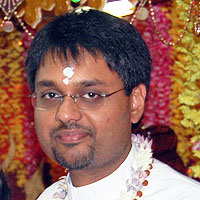Pt. Dr. Umesh Persad, Spiritual Leader, SWAHA Gyaan Deepak Kirtan Mandali
Kabir, the ancient 15th century, mystic, poet and saint, said that this world that we are living in, that we see all around us, is known as the land of the dead. The saints have all died, the books we read are written by dead people, all the messengers of God have all died, and so too, the yogis that are alive will soon be dead. The kings die; the subjects die; the leaders die; the people die; the doctors die; those who are sick die; everybody will die at some point. However, That Name without a Name, lives without any end whatsoever.
In other words, this world of life and death has no end, but the basis of the entire world, the Self, also has no end. Kabir say there is no other truth. The question we have to ask ourselves is: which one am I? Do I belong to the death world or do I belong to the immortal world? Kabir says, do not get lost in this land of the dead. Do not get caught up in this unreal world. Find out who you are: That Name without a Name.
During the period of Pitra Paksha (September 2 to 16, 2020), we reflect with gratitude on the contributions of our ancestors. We have gratitude for those who have gone before us, but we must also reflect on our own mortality. What is death? It occurs when the body stops working. The most important thing to realise is that we will all die some day. People do not wish to think about this. It is something we push far away from our mind. We hide it from ourselves and our children. This wasn’t always the case. A long time ago in the past, death was all around. Nowadays we think we can avoid death in so many ways that it is not considered. We all fundamentally resist this idea that we are going to die. We know, however, that one day we will no longer be here in this physical form. We are not here permanently.
The greatest fear of loss that we have is the loss of this body-mind. The sages tell us we must be prepared at every moment. It is important to think about death right now. What is death? The body and mind dies. Where does the self go? Across scriptures, all religions talk of the soul. We all assume the soul is somewhere inside of us and when we die, it goes somewhere else to another experience. It may come back in this or another world. This is a simple view of the soul. What really is the soul? The self is that which can’t be seen, but which sees. It is the real you. It is indistinguishable from the Supreme Awareness. The Self is everywhere. It does not move; everything moves in the Self.
Every night when we go to sleep, it is like a death. During sleep, the body seems dead; we are not aware of it. In the waking state, we go about our daily lives. In the dreaming state, the mind is aware of our dreams. Even after dreamless sleep, we wake up and are aware that we were asleep. That I is the awareness that is always present. Death is like very deep sleep where there is no perception of any object. In death, the self does not go anywhere, but this world that we perceive disappears. Different religions talk of heaven, hell or various lokas that may be experienced after death. The ego identifies with the body-mind idea. All spiritual practices aim to break that idea. It is the big delusion. When we are reborn, that awareness wakes up to perceive matter from another body. As the Bhagavad Gita says, death and rebirth is similar to taking off old clothes and putting on new ones.
How do we prepare for death? We shouldn’t be depressed and worry about death as this will affect the quality of our life. There is a quote that says, “I hope that death will not find me still unannihilated.” This means killing the delusion of body and mind. The pure self remains always and forever. If we go to the cinema, the screen shows a variety of situations, both positive and negative, but the blank screen remains unaffected by the movie. The screen is like the self: water cannot wet it; fire cannot burn it, as stated in the Bhagavad Gita. Until we realise we are the screen and not the movie, suffering will continue.
In death, the body-mind idea drops away but the true self, awareness, remains. We must prepare for death by understanding we are not the body-mind before we die.
These top five regrets that people have when they are dying are instructive in terms of how we should live life before death claims us:
- I wish I had the courage to live a life true to myself, not the life others expected of me. We should still fulfil our responsibilities but do not be swayed by the opinions of others.
- I wish I hadn’t worked so hard. Often, people are so busy working that they miss their youth, their family life and the relationships that matter.
- I wish I had the courage to express my feelings. You should say what you need to say to clear your conscience.
- I wish I had stayed in touch with my friends. Throughout your life there are key people to whom we should reach out.
- I wish that I had let myself be happier. People feel happiness comes from the world, relationships and objects, but happiness is a choice. We should choose how we respond to situations.



